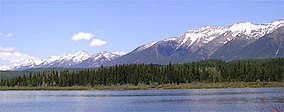Lolo National Forest
| Lolo National Forest | |
|---|---|
|
IUCN category VI (protected area with sustainable use of natural resources)
|
|

Rainy Lake in Lolo National Forest
|
|
| Location | Montana, United States |
| Nearest city | Missoula, Montana |
| Coordinates | 47°09′N 114°27′W / 47.150°N 114.450°WCoordinates: 47°09′N 114°27′W / 47.150°N 114.450°W |
| Area | 2,197,966 acres (8,894.85 km2) |
| Established | September 20, 1906 |
| Governing body | U.S. Forest Service |
| Website | Lolo National Forest |
Lolo National Forest is a national forest located in western Montana, United States with the western boundary being the state of Idaho. The forest spans 2 million acres (8,000 km2) and includes four wilderness areas; the Scapegoat and the Selway-Bitterroot Wilderness are partially within the forest while the Welcome Creek and Rattlesnake Wildernesses are solely in Lolo National Forest. The forest was created in 1906 from 4 different previous forests which were combined for administrative purposes. Lolo National Forest is west of the Continental divide and has a biodiversity influenced by both continental and maritime weather creating a transitional forest that has a high number of different plant and tree species.
Western red cedar, larch and whitebark pine share the forest with a variety of spruce and fir tree species. Western red cedars grow larger in Lolo National Forest than any other tree species does anywhere in Montana, attaining over 8 feet (250 cm) in diameter and almost 200 feet (60 m) in height. In total, 1,500 plant species exist in the forest as well as 60 species of mammals, 20 varieties of fish and 300 species of birds. Large mammals found in Lolo National Forest include the grizzly, black bear, cougar, timber wolf, mountain goat, bighorn sheep, elk, moose and mule deer. Both the bald and golden eagle reside in the forest along with trumpeter swan, herons and 30 varieties of ducks.
...
Wikipedia

